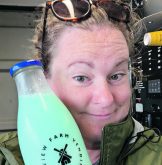INGLIS, Man. — The western lifestyle and cowboy culture epitomize the Larsen family of Shell Valley Ranch.
“We never had quads; everything was done on horseback. The kids cut their teeth on horses,” said Kevin.
His wife, Wanda, recalled their younger years in Hanna, Alta., when the Hand Hills community of ranchers would get together to move cattle.
“There was lots of interaction with others with the same interests,” she said, noting there has been less of that since their move to Manitoba to establish their ranch in 1999.
From those early beginnings grew their four children’s interest in rodeo, 4-H and stock.
Three have their professional rodeo card: Orin, 26, is a bareback rider, Tyrel, 28, is a saddle bronc rider and Kane, 24, is a bull rider who works on a ranch in Alberta.
Cassie Derkach, 30, a hairdresser who farms with her husband and their young children near Russell, Man., participated in gymkhanas at local rodeos and a 4-H beef club in addition to training horses.

Cassie and Travis Derkach, with their children, Will and Ava, farm at Russell, Man. | Derkach famly photo
A bedroom in the Larsen farm home stuffed with saddles, belt buckets and trophies attests to the family’s success in rodeo.
Derkach recalled her brothers’ summers spent away at rodeos, many of which she attended.
“I supported them lots,” said Derkach. “I always enjoyed going no matter what is was. It was always good to see them.”
That practice continues today for the Larsens, who travel to the Calgary Stampede or farther afield to watch their sons each year.
After the boys moved away, the Larsens reduced their Black Angus herd to 180 head, which are sold direct from the farm.

Orin Larsen, a bareback rodeo athlete based in Nebraska, has competed at the Canadian and National Finals Rodeo. | Matt Cohen photo
Kevin pursued rodeo in the 1970s and was the Canadian Collegiate bareback champion, but he and Wanda never pushed the sport on their children.
“They had a true desire to want to be cowboys,” said Wanda.
Once they became involved in the sport, a strong work ethic was expected, said Kevin.
“If we were hauling them to rodeos, they had to give 110 percent,” he said.
Added Wanda: “Even if you are making a lot of money, it’s very expensive.”
The family also made education a priority.
“They were fortunate enough they were good enough athletes and got scholarships,” said Kevin.
His sons started in amateur and high school rodeos, attended clinics and trained on animals and homemade bucking machines and others scattered around their farmyard. That led to being scouted by U.S. colleges, where they experienced success in rodeo while completing school: Orin in welding technology, Tyrel in business and Kane in animal science.

The Larsen home is chockful of prizes from their family’s successful years in rodeo. | Karen Morrison photo
Rodeo is a full-time job for Orin and Tyrel, who attend up to 100 of them each year and have competed in the National Finals Rodeo in Las Vegas and the Canadian Finals Rodeo.
This day, Orin, who is based in Gering, Nebraska, was leaving for Olds, Alta., and then driving the next night to Oregon.
He said growing up on a cattle ranch and seeing his parents build their business influenced his career path.
“I didn’t realize what it was until I was older and saw what it took to be where it’s at now,” he said.
Orin said he is content in the United States, creating his own path and roots as his parents did.
“I can wake up knowing I can do what I love to do,” said Orin. “I fell in love with the atmosphere of rodeos and the western way of life.”
The chance to compete with his brothers was another motivator.
“I kind of wanted to pursue that and beat them,” he said.
Being competitive is key, he added, citing his successes last year in winning in San Antonio, Texas, and Cheyenne, Wyoming, and making it to the eighth round at the NFR.
“Anyone in rodeo has to be competitive,” he said. “I don’t think success will come easily or often if you’re not competitive.”
He said the best teachers are maturity and experience on the circuit.
“The more you go year after year, the better you’ll do.”
He and Tyrel both credit support from their parents in their youth and from their partners today in helping them achieve these goals.
Tyrel, who lives with his wife and toddler in Weatherford, Oklahoma, is currently working for a veterinarian as he recovers from a torn MCL.
He said it’s the people who keep him coming back.
“Everybody is always helping each other out,” he said.
“You help everybody win because you know you will need help one day.”
Winning college finals and appearing at the CFR and NFR are among the career highlights for Tyrel, who said the money has improved to the point where it’s a good living.
“As long as I can keep making a living at it, I’ll keep doing it.”

















